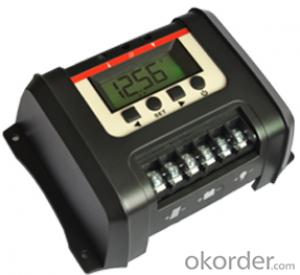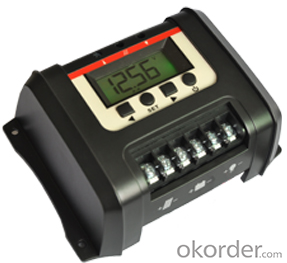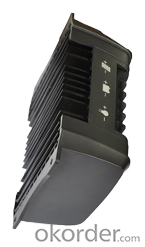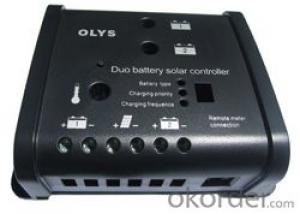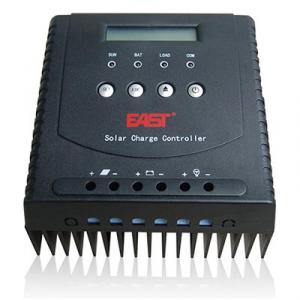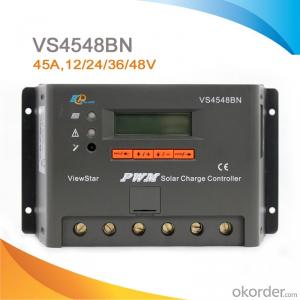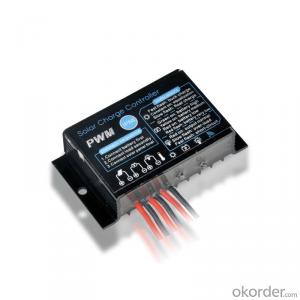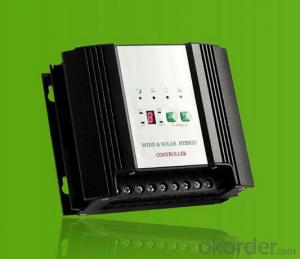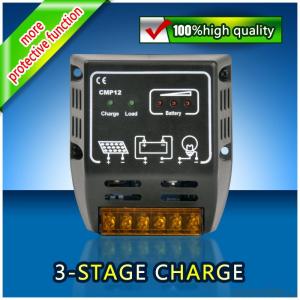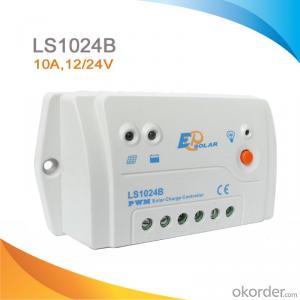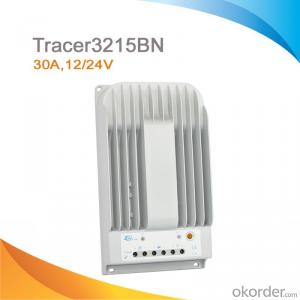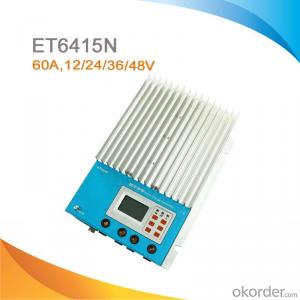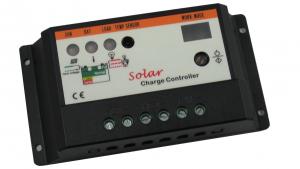Xw Solar Charge Controllers with LCD Display
- Loading Port:
- Shekou
- Payment Terms:
- TT OR LC
- Min Order Qty:
- 50 unit
- Supply Capability:
- 100000 unit/month
OKorder Service Pledge
OKorder Financial Service
You Might Also Like
1. The charge controller automatically recognize 12V or 24V system.
2. Mainly suitable for small off-grid solar power system, for example: home solar power systems, ships, self-service base stations, outposts, etc.
3. LCD display various parameters of charge and discharge.
4. Boost charge voltage and battery low voltage protection point can be adjustable 5. The three-stage PWM charging mode
6. Load output can be manually controlled。
7. With high-precision temperature compensation function.
8. With electronic protection
Technical Data
| MODEL | SNC10 SNC20 SNC30 SNC40 |
| Max.solar panel current | 10A 20A 30A 40A |
| Max. load current | 10A 20A 30A 40A |
| NO-load current | 10MA |
| Overvoltage protection | 15.5V(12V), 31V/24V; |
| Work temperature range: | -35℃--+55℃ |
| Boost voltage | 14.6V(12V), 29.2V/(24V) |
| Equalization voltage | 14.8V(12V), 29.6/(24V) |
Float voltage | 13.8V(12V), 27.6V/(24V) |
Recharge voltage | 13.2V(12V); 26.4/(24V); |
Temperature compensation | -5mv/℃/2V |
Low-voltage disconnect | 11V(12V); 22/24V; |
Load reconnect voltage | 12.6V(12V), 25.2/24V |
Charge control mode | PWM |
diplay mode | LCD |
- Q: Can a solar controller be used with solar-powered indoor security systems?
- Yes, a solar controller can be used with solar-powered indoor security systems. A solar controller is responsible for regulating the power generated by solar panels and ensuring optimal charging of batteries. Since solar-powered indoor security systems rely on solar energy to operate, a solar controller can effectively manage the power supply and ensure uninterrupted operation of the security system.
- Q: How does a solar controller prevent damage from reverse current flow in the load?
- A solar controller prevents damage from reverse current flow in the load by incorporating a blocking diode or a solid-state relay in its design. These components ensure that current flows only from the solar panel to the load, preventing any backflow of current. This protective measure prevents the load from being damaged by reverse current and ensures the efficient operation of the solar system.
- Q: What is the operating temperature range of a solar controller?
- The operating temperature range of a solar controller typically varies depending on the specific model and manufacturer. However, most solar controllers are designed to operate within a temperature range of -20°C to 60°C (-4°F to 140°F). These temperature limits ensure that the controller can effectively regulate the flow of electricity and manage the charging and discharging of the battery in various weather conditions. It is important to note that extreme temperatures, especially on the higher end of the range, may affect the efficiency and performance of the controller, so it is advisable to install the controller in a well-ventilated, shaded area to minimize any potential heat-related issues.
- Q: Can a solar controller be used with a solar-powered street lighting system?
- Yes, a solar controller can be used with a solar-powered street lighting system. A solar controller helps regulate and optimize the charging and discharging of batteries in a solar-powered system, ensuring efficient operation and extending battery lifespan. It is an essential component in managing the power flow between the solar panels, batteries, and street lights in a solar street lighting system.
- Q: Can a solar controller be used with different types of solar panel anti-theft systems?
- Different types of solar panel anti-theft systems can be used with a solar controller. The primary function of the solar controller is to regulate battery charging in a solar power system, and it does not directly interact with the anti-theft system. Solar panel anti-theft systems are designed to prevent theft or unauthorized access to the solar panels. These systems typically include tamper-proof screws, locking mechanisms, alarms, or GPS tracking devices. They are installed separately from the solar controller and do not rely on its compatibility. The main role of the solar controller is to monitor and regulate the flow of electricity from the solar panels to the batteries. It ensures efficient charging of the batteries and protects them from overcharging or damage. The type of anti-theft system used does not impact the functionality of the solar controller. Therefore, the solar controller can still be used without any problems, regardless of the type of anti-theft system implemented. It is crucial to choose a solar controller that is compatible with the specific requirements of the solar power system, such as voltage and current ratings, to ensure optimal performance and efficiency.
- Q: What is the maximum power consumption of a solar controller itself?
- The maximum power consumption of a solar controller itself typically ranges between 0.5 watts to 5 watts, depending on the model and features of the controller.
- Q: Can a solar controller be used with solar-powered indoor hospitality facilities?
- Yes, a solar controller can be used with solar-powered indoor hospitality facilities. A solar controller is an essential component of a solar power system as it regulates the flow of electricity from the solar panels to the batteries. In the case of indoor hospitality facilities powered by solar energy, the solar controller would play a crucial role in managing the energy generated by the solar panels and ensuring it is efficiently stored in batteries for use during times when sunlight is not available, such as during nighttime or cloudy days. By using a solar controller, indoor hospitality facilities can effectively harness solar power and rely on it as a sustainable and renewable energy source to power their operations.
- Q: Can a solar controller handle power surges from the utility grid?
- No, a solar controller typically cannot handle power surges from the utility grid. Its primary function is to regulate and control the flow of electricity from the solar panels to the battery bank. Power surges from the utility grid are usually handled by surge protectors or other equipment specifically designed for that purpose.
- Q: How does a solar controller prevent batteries from discharging at night?
- A solar controller prevents batteries from discharging at night by monitoring the energy flow and regulating the charging and discharging process. It acts as a bridge between the solar panels and the batteries, ensuring that the energy generated by the panels is effectively stored in the batteries during the day and preventing any reverse current flow during nighttime.
- Q: How does a solar controller prevent deep discharge of batteries?
- A solar controller prevents deep discharge of batteries by monitoring the voltage level of the batteries. When the voltage drops below a certain threshold indicating that the batteries are being discharged deeply, the solar controller automatically disconnects the batteries from the solar panels, preventing further discharge and protecting the batteries from potential damage.
Send your message to us
Xw Solar Charge Controllers with LCD Display
- Loading Port:
- Shekou
- Payment Terms:
- TT OR LC
- Min Order Qty:
- 50 unit
- Supply Capability:
- 100000 unit/month
OKorder Service Pledge
OKorder Financial Service
Similar products
Hot products
Hot Searches
Related keywords
